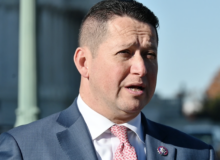As my colleague Rusty Weiss at his site Mental Recession reported, on Monday CNN falsely quoted Republican nominee Donald Trump. What the Republican nominee said was:
“But Israel has done an unbelievable job and they’ll profile. They profile. They see somebody that’s suspicious, they will profile. They will take that person in,”
CNN ran the quote under the header, “Trump says ‘racial profiling’ will stop terror,” but Trump never said the word “racial” in relation to profiling.
Rusty correctly said that Trump didn’t elaborate about what criteria investigators should use when they profile a potential terrorist. But I can fill that hole and explain the “Israeli” way of profiling. It’s totally different than what is done here in the U.S., but it is effective.
The real difference between the Israeli and American approach is the goal. Israel tries to identify and stop the terrorist while in the U.S. we try and stop the bomb or other weapon. The Israeli approach is totally void of politics and is consistent no matter who sits in the Prime Minister’s office. The Israeli government realizes the fight against terrorism is a fight for its very survival. Thus her government and citizenry have a view of preventing terrorism that is unencumbered by the political correctness which restrains efforts in the United States.
Donald Trump is correct, the political correctness has to stop if we are going to prevent terrorism in America.
This doesn’t mean preventing everybody from one faith or another from entering the country. It’s an entirely different approach which the ISA (the Israeli Security Agency also known as Shin Bet) calls looking for the “human factor.”
Some parts of that human factor would cause Al Sharpton’s ears to bleed just before he shows up to picket the Airport because ethnic profiling of passengers does have a role in Israel’s multilevel approach. However, ethnicity is only one element of the profiling, country of origin, religion, general appearance and the most important element behavior, are all part of the data used to profile.
Wherever that profile is being made, no matter what country a flight is leaving from, if the destination is Israel, an Israeli doing the screening. Israel does not believe in trusting its security to citizens of other countries and neither should the United States.
All passengers traveling to and from Israel are questioned by security staff. For Jewish Israelis, the process takes a couple of minutes at most, with passengers being asked whether they packed their luggage alone, and whether anyone had access to the luggage once it was packed. Jewish tourists also usually pass through security within a few minutes.
When my family entered the El Al terminal at Newark Airport before our last trip to Israel, we were greeted at the entrance by someone who asked where we came from and where were going.
When we made our way to the check in line, a ISA security employee in a suit and tie asked my then 12-year-old son out of my ear’s range why we were going to Israel. He was asked if we were Jewish and when my son answered yes, the screener followed up by asking the name of our Synagogue and our Rabbi’s name. My son’s answers didn’t really matter. The entire time he was asking my son questions the ISA employee was looking at my wife and me, gauging our reaction to the questioning of our kid. The entire process with my son took less than 30 seconds.
When the security guy was done with my son, he came to me and asked me the same questions (plus the typical who packed your luggage-type queries). Once again he was gauging my reaction very closely, and looking over at my wife to see her reaction. He was checking our behavior.
The process continued with my daughter and my wife.
Like the Mossad, tank drivers, and air force pilots, Israeli airport security has that super hero, no-nonsense, get to the point directness, efficiency and professionalism, “Who packed your bags?” “What was your Bar Mitzvah portion?” “Why are you visiting Israel?”
This quick-fire interrogation was not bothersome but reassuring. It gave us feeling we were dealing with people who knew what they were doing. After all it was very important to us that when we returned to the ground it was because our plane was landing, not because it was blown up somewhere over the Atlantic Ocean.
Non-Jewish tourists tend to be questioned a bit more thoroughly, and may be grilled over the purpose of their visit and about their accommodation.… the procedure for Arabs and Muslims who are not Israelis can sometimes be lengthier and irritating. Visitors who have passport stamps from countries hostile to Israel are also questioned intensively in what can be a traumatic experience for the uninitiated. Of course many in the politically correct set would object to that procedure, but Arabs and Muslims are not banned, they are just asked some more questions. But then again if one tries to travel to the UAE and your passport has been stamped with a visit to Israel, you may be denied entrance into the country and sent home.
Of course anyone admitting to leaving their luggage at an airport or bus station left-luggage area before check-in will have their suitcases stripped, with each item individually checked and re-packed.
The individual check also happens with “wise-asses,” like the people who were in line in front of me when I was flying to Israel. These security people are serious but polite and expect the same out of the passengers.
Being Muslim or Arab won’t get you the extreme bag-check treatment, but it will make the questioners pay a bit more attention to your behavior.

If I had been more attentive when traveling to Israel, I would have noticed that throughout the El Al terminal there were “armed eyes” surreptitiously looking at my family as well as everyone else in the terminal. These observers were making the same behavioral profiles as the guy who questioned us on line.
“It is mind-boggling for us Israelis to look at what happens in North America, because we went through this 50 years ago,” said Rafi Sela, president of AR Challenges, a global transportation security consultancy. Officers are looking for nervousness or other signs of “distress” — behavioral profiling. Sela rejects the argument that profiling is discriminatory.
“The word ‘profiling’ is a political invention by people who don’t want to do security,” he said. “To us, it doesn’t matter if he’s black, white, young or old. It’s just his behavior. So what kind of privacy am I really stepping on when I’m doing this?”
Another important difference is that you don’t just come off the street and get a job with the ISA (Israel Security Agency). It is not your typical civil service job, like the TSA. Shin Bet is one of three principal organizations of the Israeli intelligence community (the other two are Mossad and Military intelligence). These security agents are ex-military and are selected based on their intelligence and their ability to behavior profile. The agents are rotated around to different points of entry every few months to keep them sharp.
Shlomo Harnoy, vice president of the Sdema group, an Israeli security consultancy firm which specializes in aviation security, gave the example of Umar Farouk Abdulmutallab, the Nigerian who tried to blow up the Detroit-bound Northwest Airlines aircraft on Christmas Day a few years ago. Harnoy says the Nigerian would have been detained “within seconds” at Ben Gurion airport before getting on the plane. According to Harnoy, a young Muslim traveling alone, on a one-way ticket, with no luggage, was an obvious suspect.
Harnoy, who once headed the Israel Security Agency’s aviation security department, believes investing millions in new technology is not the answer.
“Whoever is concentrating on stopping old ladies bringing a bottle of mineral water on to the plane will not find the terrorist, or the bomb. The old lady is not a suicide bomber and the bottle of water is not a bomb component.”
Not only do most Israeli security selectors have degree-level education, they are trained to the highest standards. The most important element in the “human factor” is that security guards understand the threat to the country.
Additionally, on every El Al flight there are armed air marshals. You won’t know who they are, but allow me to suggest that you don’t make a mid-air fuss to find out.
As for my family’s brush with Israeli Airport Security, we arrived in Ben Gurion Airport twelve hours later, tired but not even realizing that we went through a more extensive security process than we ever had before.
The TSA needs to adapt the entire Israeli process; not just the behavioral screening but the ethnic elements; not just the screening at the gates, but throughout the terminal and on the planes. We need to adapt to their training, and we need to select our agents the way Israel does based on military training and intelligence (personally I think it would be a great job for Special Forces vets).
And on the Israel side the process is virtually painless. As Rafi Sela described it:
“First, it’s fast — there’s almost no line. That’s because they’re not looking for liquids, they’re not looking at your shoes. They’re not looking for everything they look for in North America. They just look at you,” said Sela. “Even today with the heightened security in North America, they will check your items to death. But they will never look at you, at how you behave. They will never look into your eyes … and that’s how you figure out the bad guys from the good guys.”
The goal at Ben Gurion is to move fliers from the parking lot to the airport lounge in a maximum of 25 minutes and my family went through it in half that time.
During her 68-year long battle against terrorism, Israel has achieved a balance between protection of civil liberties and the prevention of violence. In the end they believe the sanctity of saving human lives outweighs possible targeting and inconvenience of the extra questioning of a few.
And it’s not only airports. The same concept applies to other large public locations. While one doesn’t get questioned when entering a giant shopping center, the people looking at the shoppers’ behavior are there.
Surely they were also there in walking shopping areas such as Ben Yehuda Street in Jerusalem, and at major tourist and religious site. Most restaurants and many shops had a guard outside with a hand-held metal scanner, and to be honest after the first two or three, the scans ceased being noticeable.
The object is not to discriminate, but to make sure everybody, no matter their faith, their background, or the color of their skin gets home in one piece.
And the only way to do that is to combine everything about them, with the way they act. That is behavioral profiling.






